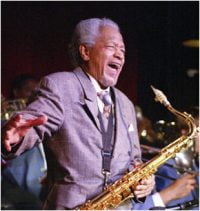31.10. – Happy Birthday !!! One of the nicer things to have happened to jazz in the last decade or so has been the re-emergence of the saxophonist and band leader Illinois Jacquet as one of music’s biggest stars.
Mr. Jacquet, who is 71, has blossomed under the attention, grooming one of the best big bands working, and he continues to add profundity to his own improvisations on saxophone. He is one of the few remaining musicians who reflect jazz’s roots in entertainment, and his performances whisper little vaudevillian truths, truths that come from a different era but are no less effective today.
And Mr. Jacquet is generous as a host and as a musician. On Tuesday night at Carnegie Hall, ostensibly a tribute to him for the 50th anniversary of his appearance in the film “Jammin’ the Blues,” he filled the place with an audience eager for his gifts and more than willing to jump to its feet to show appreciation.
The concert opened with Mr. Jacquet and his band gliding effortlessly into some of its best material. Mr. Jacquet’s band recalls the Count Basie orchestra of the 1950’s, glossy and smooth and the perfect cushion for Mr. Jacquet’s hard sound. He and the band performed an early hit of his, “Robbins’ Nest,” taking the tempo at a restrained pace that suggested power held in reserve. They performed “Three Buckets of Jive,” “Body and Soul” and were joined by the singer Etta Jones, who nearly took the whole show away with her rendition of “Blowtop Blues.”
Mr. Jacquet produced a handful of classically balanced solos that were structurally unassailable. He had seemingly infinite patience, opening each improvisation with a small melody that picked up notes until, with an eruption, they became explosive. On “Body and Soul” he let great gusts of sound seep out of his horn as he picked through the tune’s complicated harmonies. And on “Robbins’ Nest” he lay in ambush for the tune’s bridge, setting up melodies to be answered by prearranged riffs from his orchestra. Mr. Jacquet is the greatest practicing swing tenor saxophonist, and he is playing with as much authority and sophistication as he ever has.
The second half opened with a jam session that took the life right out of the hall. Mr. Jacquet arrived dressed up in part the way he had in “Jammin’ the Blues,” and brought out a group of guests that included Harry (Sweets) Edison on trumpet, Josh Redman on tenor saxophone, Jamal Haynes on trombone, Ray Bryant on piano, Gray Sargent on guitar, Milt Hinton on bass and Roy Haynes on drums. Time stood still on an opening blues; Mr. Haynes and the rest of the band never quite meshed. And the soloists, Mr. Jacquet excepted, sounded fragile and tentative, as if they couldn’t hear each other.
Then Ray Charles came out, and everything truly fell apart, but in a good way this time. Mr. Charles and Mr. Jacquet’s band played “Georgia” perfunctorily, and it looked as if he were poised to sleepwalk through his material. Then he and Mr. Jacquet began performing some blues, and Mr. Charles, a fine, eccentric pianist, began to enjoy himself, throwing ideas around and changing the sound of his electric keyboard to vibraphone and guitar and other, odder electric colors. But it all worked, and when Mr. Jacquet soloed a wild air of improvisation filled the room.
Then out came Lionel Hampton, Mr. Jacquet’s old employer, and he and the band played “Flying Home,” featuring Mr. Jacquet performing the solo that made him famous, and joined by Ray Charles. The music left a good-natured feeling in the hall, and the audience jumped up for a standing ovation. In part they were applauding Mr. Jacquet’s generosity – he had played the genial host at a celebration to himself. He could afford to; the level of his improvisations hadn’t been challenged all night.







More Stories
CD review: George Benson – Dreams Do Come True: When George Benson Meets Robert Farnon – 2024: Video, CD cover
The band was tight as ever. The Warren Haynes Band cuts loose: Video, Photos
Interview with Alvin Queen: Feeling Good – I heard these tunes played by … Video, new CD cover, Photos